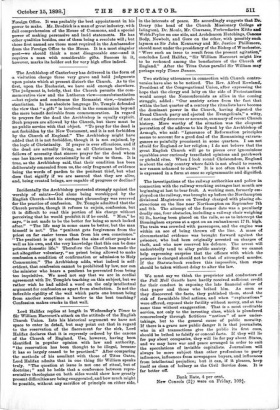Lord Halifax replies at length in Wednesday's Times to Sir
William Harcourt's attack on the attitude of the English Church Union. Into his historical argument we have not space to enter in detail, but may point out that in regard to the reservation of the Sacrament for the sick, Lord Halifax declares that it is expressly ordered by the canons of the Church of England. Use, however, having been identified in popular opinion with law and authority, "the reservation has been thought to be illegal, because it has so largely ceased to be practised." After comparing the methods of his assailant with those of Titus Oates, Lord Halifax admits that in one thing Sir William speaks truly. "The question at issue is not one of ritual, but of doctrine;" and he holds that a conference between repre- sentative theologians on both sides would show how greatly present difficulties are being exaggerated, and how much might be possible, without any sacrifice of principle on either side,
in the interests of peace. He accordingly suggests that Dr. Drury (the head of the Church Missionary College ats Islington), Dr. Motile, Mr. Chavasse, Prebendaries Kitto and Webb-Peploe on one side, and Archdeacon Hatchings, Canons Body, Newbolt, and Gore on the other, with possibly such laymen as Sir John Kennaway and Mr. Justice Phillimore, should meet under the presidency of the Bishop of Winchester. "Were such an issue to result from the present agitation," concludes Lord Halifax, "Sir William Harcourt might live to be reckoned among the benefactors of the Church of England." After the Titus Oates parallel Sir William may perhaps reply Timeo Danaos.






































 Previous page
Previous page